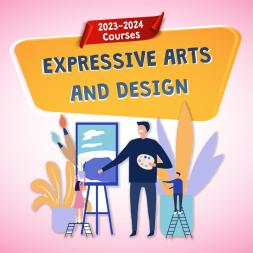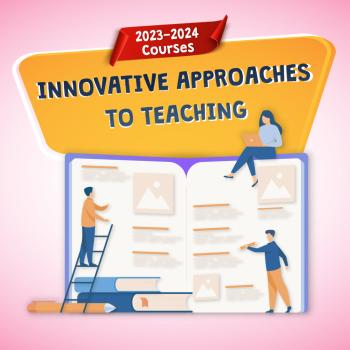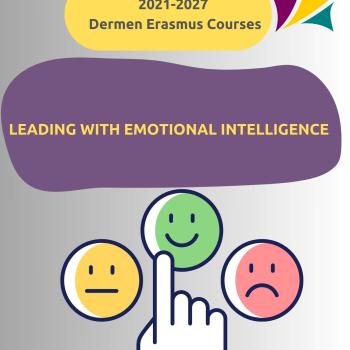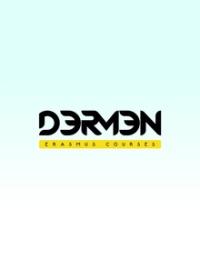
EXPRESSIVE ARTS AND DESIGN
Expressive arts and design encompass a rich realm of creative exploration, encouraging individuals to communicate, interpret, and innovate through various artistic forms and mediums. This multifaceted domain intertwines imagination, emotions, and skills, fostering an environment where one's artistic voice and unique expression can flourish
Description
The Expressive Arts and Design course is an inspiring and transformative journey that celebrates creativity and self-expression across all age groups. Participants embark on an immersive exploration of various art forms, including visual arts, music, dance, drama, and storytelling, discovering how these modalities can be powerful means of communication and emotional exploration.
Throughout the course, participants gain insights into the developmental benefits of engaging in expressive arts. They learn how expressive arts can enhance fine and gross motor skills, language development, emotional intelligence, and overall well-being at different stages of life.
A person-centered approach lies at the heart of this course, as participants are encouraged to honor each individual’s unique creative expression. They discover the importance of creating inclusive environments that celebrate diverse voices and perspectives, fostering a sense of belonging and acceptance.
The therapeutic aspects of expressive arts are also explored, showing how art can be a powerful tool for emotional expression, healing, and personal growth. Participants delve into the use of expressive arts in therapeutic settings, including art therapy, dance therapy, and music therapy, witnessing how creativity can be a catalyst for positive change and resilience.
The course offers hands-on experiences in various art forms, providing participants with the opportunity to experiment and engage in creative exploration. It emphasizes collaborative and group creative experiences, encouraging individuals to work together, share ideas, and experience the joy of collective creativity.
Participants also gain insights into the role of facilitators, educators, and caregivers in supporting and nurturing creativity in others. They explore how technology and digital tools can enhance expressive arts experiences, offering new avenues for creative expression and exploration.
Real-world examples of successful expressive
Learning objectives
- To introduce participants to the concept of expressive arts and its significance in fostering creativity, self-expression, and emotional well-being across all age groups.
- To explore various art forms, including visual arts, music, dance, drama, and storytelling, as powerful means of communication and creative exploration for individuals of all ages.
- To understand the developmental benefits of expressive arts, such as enhancing fine and gross motor skills, language development, and emotional intelligence, for individuals at different stages of life.
- To equip educators, caregivers, and practitioners in various fields with practical strategies for incorporating expressive arts into their work and daily activities.
- To encourage a person-centered approach in which individuals are encouraged to explore and express their creativity authentically.
- To foster an inclusive environment that respects and celebrates diverse expressions of creativity and cultural backgrounds.
- To provide insights into the therapeutic aspects of expressive arts and its role in promoting well-being, personal growth, and healing for individuals of all ages.
- To promote the use of open-ended materials and environments that inspire creativity and imagination.
- To facilitate collaborative and group creative experiences, encouraging participants to work together, share ideas, and engage in cooperative play or creation.
- To explore the role of educators, facilitators, and caregivers as guides and supporters in the creative process, allowing individuals to explore and express themselves freely.
- To highlight the importance of expressive arts in building individuals’ confidence, self-esteem, and sense of identity.
- To encourage the integration of technology and digital tools in expressive arts, offering new avenues for creative expression and exploration.
- To showcase successful examples of expressive arts projects and initiatives across various age groups, inspiring participants to implement similar
Methodology & assessment
Certification details
Certificates will be delivered in hard copy format and will include information about the course title, participant name, organization name (host and sender), duration, number of training hours, and the main topics covered in the course. The certificates are signed both by the administrator of the host organisation and by the trainer.
Pricing, packages and other information
-
Price:400Euro
Additional information
-
Language:English
-
Target audience ISCED:Early childhood education (ISCED 0)Primary education (ISCED 1)Lower secondary education (ISCED 2)
-
Target audience type:TeacherSchool PsychologistOther
-
Learning time:25 hours or more
Upcoming sessions
Past sessions
More courses by this organiser




